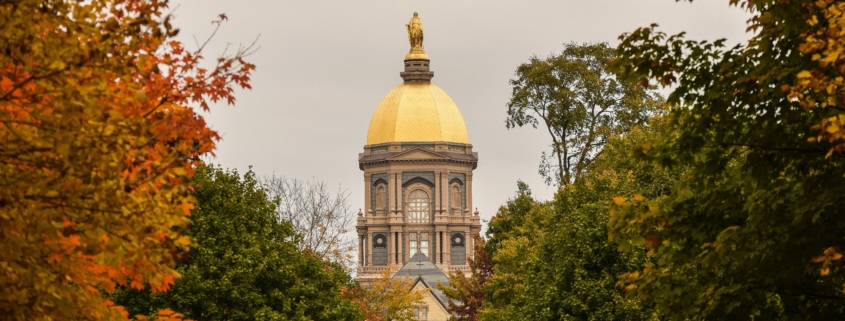All-Night Dorm Visits at Notre Dame?
A group of students at the University of Notre Dame recently staged a sit-in to protest “parietals”: rules prohibiting students of the opposite sex from spending the night in each other’s dorm rooms. But ending one of the few remaining protections for chastity on a college campus is a terrible idea.
For years, Notre Dame students have made arguments against parietals, but this new effort is driven by students who claim that the University is too “heteronormative” and promotes “sexism and queerphobia” by limiting visitation from opposite-sex students.
Whatever the motivation, doing away with parietals would be a disaster. It would invite higher rates of sexual activity, sexual assault, contraception, STDs, pregnancy and abortion. It would invite mortal sin—a concern that many today think old-fashioned, but hopefully the priests and leaders at Notre Dame care deeply about such things.
Ironically, the protesters seem not to be targeting Notre Dame’s single-sex dorms. The university’s steadfast commitment to men’s and women’s dorms is admirable, given that most American colleges—including most Catholic ones—switched long ago to coed residences. Studies find that coed dorms have higher rates of drinking and sexual activity.
But still, loose rules allowing opposite-sex visitors to stay in bedrooms until late-night hours can quickly undermine the benefits of single-sex dorms, especially with regard to sexual activity. At Notre Dame, opposite-sex visitors can be in student bedrooms until midnight on weeknights and 2 a.m. on weekends. These are hours when students are more likely to be sexually active and under the influence of alcohol and drugs.
The protesters are right, then, to target parietals if they want to dramatically change campus culture. Notre Dame should reject their pleas.
Even more, Notre Dame should consider further limiting nighttime visitation and insisting on open doors when someone of the opposite sex is present. Even better, the university would provide sufficient meeting spaces for students in other buildings and end opposite-sex visitation to dorm rooms altogether.
What if Notre Dame’s politically correct leaders feel compelled to appease the misguided students who find parietals to be too “heteronormative?” There’s a simple answer: end all visitation to dorm rooms, by any student who does not live in the room, throughout the day. This has the added advantage of promoting chastity among even the homosexual students at Notre Dame.
Reducing Sexual Assault
College-aged females have the highest rates of sexual assault, according to the U.S. Department of Justice, and Notre Dame has its share of such crimes.
Although studies show that most sexual assaults against college students take place off campus, about a third occur within student dorms. Reducing off-campus assaults is necessary but very difficult; reducing on-campus assaults could begin with simply reforming dorm visitation policies.
Studies show that two key factors are associated with sexual assault on campus: drinking and casual sex. When looking at the sexual assaults of college-aged females, one study found that 47% of victims perceived their attacker was drinking or using drugs. Additionally, the facts show that 78% of on-campus sexual assaults took place during what started as casual sexual encounters.
Also, a third factor seems to be the time of day. A study found that 52% of forced sexual assaults and 90% of assaults on incapacitated victims took place between midnight and 6 a.m. Most of the others occurred between 6 p.m. and midnight.
A survey of students at Notre Dame bears similar results to the national studies. In 2018, 7% of female students said they had experienced “non-consensual sexual intercourse” while studying at Notre Dame. Of the assaults that occurred during the last year, 58% were committed within residences on Notre Dame’s campus. And in nearly two-thirds of the incidents, the victim was familiar with the attacker prior to the day of the assault.
Is any of this surprising? Put unsupervised young adults in bedrooms, behind closed doors, in the evening or late at night, when they are more likely to be impaired by alcohol or drugs, and serious problems will result.
A Catholic college should be greatly concerned about the spiritual health of its students, as well as the epidemic of STDs and high rates of abortion among college-age Americans. But even a secular college that has no problem with premarital sex and abortion should see the obvious implications for sexual assault.
Not Just Notre Dame
When The Cardinal Newman Society looked at dorm visitation policies at Catholic colleges across the country, we were shocked to find that more than a quarter of residential Catholic colleges have no restriction on all-night opposite-sex visits. Most others are like Notre Dame, with weeknight visitation until midnight or later, and weekend visitation until 2 a.m. or later. Doors may remain closed.
This indicates that Catholic college leaders across the country are turning a blind eye to what is going on in dorms late at night. This needs to change, and Notre Dame could set a powerful example if it reformed its policies appropriately.
No policy change will completely change a campus culture, but stronger visitation policies could help prevent many sexual assaults and send a clear message about the college’s expectation of chastity among its students. Catholic college leaders should do all within their power to create safe and healthy environments on campus.
This is a golden opportunity for Notre Dame to stand up for Catholic values, and implementing a few common-sense measures could go a long way to help keep students safe.
This article first appeared at The National Catholic Register.

 Anthony Melone on Unsplash.com
Anthony Melone on Unsplash.com